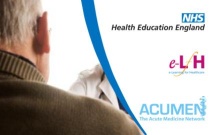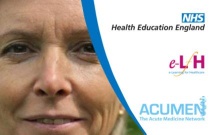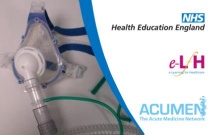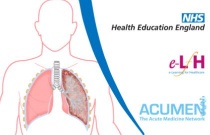Public Health Roles of Eye Health Professionals, Patients and the Wider Public
Andy Cassels-Brown, Yvonne Needham
This session describes the roles of the health and social care workers, the patient and the public in preventing visual disability and blindness. You will understand the main functions and strengths of different workers and the ways in which they can collectively facilitate high quality eye care for their individual patients.
Protecting Small Babies from Infection (with subtitles)
GHM
This course is about protecting small babies from infection
Continuous positive airway pressure plus low flow oxygen versus usual care of severe acute cardiogenic pulmonary edema in the pre-hospital setting: A randomised controlled trial
Michael A. Austin,Karen Wills,David Kilpatrick,E. Haydn Walters
Congestive heart failure occurred in 5.7 million Americans. Invasive ventilation increases the risk of complications, including hospital acquired infection (HAI) (pneumonia, sinusitis) and tracheal injury, and consequently may prolong ICU and hospital stay. Despite the potential advantages of CPAP for the management of severe AC....
Termination of mid-trimester pregnancies: misoprostol versus concurrent weighted Foley catheter and misoprostol
Ayman Shabana,Hesham Salah,Mohamed Kandil,Emad Soliman,Dalia Morsi
The universal prenatal screening programs have lead to an increase in the diagnosis of congenital malformations with subsequent gradual increase in second trimester termination of pregnancy (TOP). Termination in the second trimester is more risky than during the first trimester. Several studies have described the Foley’s cathete....
Healthcare providers’ perspective on barriers to optimal HIV index testing: an interview-based study
Cibangu Katamba
Global HIV testing services (HTS) and antiretroviral therapy have seen a substantial scale up. A study conducted in Zambia revealed that index testing coupled with targeted community-led HTS are useful strategies to diagnose men living with HIV. Effective approaches to HIV testing are needed to reach undiagnosed people and link....
Case Report: Concomitant coronary stent and femoral artery thrombosis in the setting of heparin-induced thrombocytopenia
Mejdi Ben Messaoud,Mezri Maatouk,Mohamed Mehdi Boussaada,Marouane Mahjoub,Walid Mnari,Habib Gamra
Heparin is a commonly used anticoagulant for hospitalized patients, but its use can lead to devastating complications, such as heparin-induced thrombocytopenia (HIT)n
Intra-canal medication containing silver nanoparticle versus calcium hydroxide in reducing postoperative pain: A randomized clinical trial
Fatma El Zahraa El Abbasy,Salsabyl Ibrahim,Olfat Shaker,Geraldine Ahmed
Pain in endodontic treatment is a major concern for patients and clinicians. Many factors can cause pain like bacteria, chemical mediators, change in cyclic mediators, change in periapical tissue pressure, and psychological factors. However, the presence of microorganisms as a result of failure to properly disinfect the canal is....
Case Report: Clinical manifestation and dental management of Papillon-Lefèvre syndrome
Yasmin Mohamed Yousry,Amr Ezzat Abd EL-Latif,Randa Youssef Abd El-Gawad
Papillon-Lefèvre syndrome (PLS) is an autosomal recessive disorder that typically becomes apparent from one to five years of age, which coincides with the timing of eruption of primary dentition. The estimated prevalence of the syndrome is 1–4 cases per million individuals. The exact etiopathogenesis of the syndrome is relativel....
Effect of gestational diabetes mellitus on maternal thyroid function and body mass index
Elrazi A. Ali,Hala Abdullahi,Duria A. Rayis,Ishag Adam,Mohamed F. Lutfi
Abnormal thyroid function and glucose tolerance have been both reported during pregnancy. Weight gain is common among subjects with insulin resistancen
Systemic lupus erythematosus and Hodgkin disease
Besma Ben Dhaou,Fatma Boussema,Zohra Aydi,Lilia Baili,Lilia Rokbani
Systemic lupus erythematosus (SLE) is associated with lymphoproliferative diseases such as Hodgkin’s lymphoma (HL)n
Incisional correction of corneal astigmatism during phacoemulsification – a randomized trial
Najah K. Mohammad,Tamer F. Elewa,Enas B. Aldehaimy,Tareq A. Almamoun
Currently cataract surgery is considered to be a refractive surgery, with the main therapeutic goal of achieving emmetropia; as a result, correction of corneal astigmatism becomes essential for such an operation.. It is possible to reduce pre-existing corneal astigmatism by creating a clear corneal incision at the steep meridian....
Cost analysis of outpatient services for major external structural birth defects: An ingredient approach in selected hospitals in Kiambu County, Kenya
George N. Agot,Joseph K. Wang'ombe,Marshal M. Mweu
Major external structural birth defects (MESBDs) are defined as physical abnormalities of intrauterine origin present from birth, detectable visually, and having significant health and development impacts. MESBDs continue to occur exerting an enormous economic burden on individuals and health services in developing countries; ho....
Adolescent girls’ attitudes toward female genital mutilation: a study in seven African countries
Koustuv Dalal,Zhanna Kalmatayeva,Sourav Mandal,Gainel Ussatayeva,Ming Shinn Lee,Animesh Biswas
Female genital mutilation (FGM) is a major public health problem in some parts of the world, especially in Africa and the Middle East. The first step toward changing the practice of FGM is to change attitudes toward it, even though this can be difficult and psychologically painful. More women than men support the practice. A mul....
Local indigenous knowledge about some medicinal plants in and around Kakamega forest in western Kenya
Nickson Erick Otieno,Caleb Analo
Although community development goals are not always consistent with biodiversity conservation objectives. Like in many parts of the developing world, there is a growing upsurge in demand for herbal and other traditional remedies for various ailments among communities in Kenya. This is due either to the increasing cost of convent....
Self-reported COVID-19 among physicians: An Egyptian online study during the pandemic
Hala Samir Abou-ElWafa,Abdel-Hady El-Gilany,Ahmed A. Albadry
COVID-19, has become a universal threat to public health. During the initial wave of the COVID-19 pandemic, overstrained healthcare systems in severely affected countries left healthcare workers fighting with prolonged work hours, intense emotional stress, and fatigue. Speedily declining resources, lockdowns, and a high demand f....
History of Acute Asthma
Ramin Baghai-Ravary
This session examines the history of acute asthma presentation and how it relates to the underlying pathophysiology. It goes on to identify important indicators of acute and life-threatening disease.
Differentiating COPD and Asthma
John Hurst
COPD and asthma are both common conditions that affect the airways and can present in similar ways. It is important to differentiate between the two and understand how this can be done. This session is designed to address these questions.
The Difference Between BiPAP and CPAP
Phil Raines
This session discusses the principle differences between bi-level positive airways pressure (BiPAP) and continuous positive airways pressure (CPAP), and provides a brief summary as to how they work and when to use them.
Management of Drug Induced Breathlessness
Elora Mukherjee
This session discusses the investigation and management of patients with drug induced breathlessness, a commonly overlooked presentation with potentially long-term adverse drug effects. The session looks at how to interpret test results to confirm the diagnosis and how best to manage the patient thereafter.
Definition and Description of Bronchiectasis
Gaurav Agarwal
This session describes bronchiectasis and its causes.












